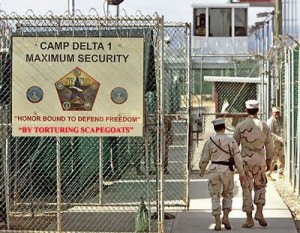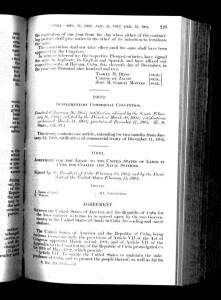This Week in Guantánamo: 1903 and 2012
This Week in Guantánamo: Present and Past
2012:
This week, a federal appeals court ruled against a lawsuit filed by the families of 2 Guantánamo detainees who allegedly committed suicide while at the naval base. The appeals court ruling is based on the 2006 congressional Military Commissions Act, which prevents U.S. courts from ruling on Guantánamo detainee treatment.
In June 2006 Guantánamo detainees Yasser Al-Zahrani and Salah Ali Abdullah Ahmed Al-Salam hanged themselves in their cells, according to the U.S. government. Al-Zahrani was twenty-two when he died, and was detained at age 17. Al-Salam was thirty-seven. The detainees’ families disputed the government’s allegation, claiming the detainees died as a result of inhumane treatment, arbitrary detention, and torture – all of which violate the Geneva Conventions. The families subsequently filed a lawsuit against U.S. officials for financial damages.
1903:
This week in 1903, President Theodore Roosevelt signed the peculiar agreement with Cuba that laid the foundation of Guantánamo as we know it. The U.S. came to Cuba’s aid during the Spanish-American war and ousted the Spanish in 1898. In 1903, as a condition of continued U.S. support for Cuban democracy, the Cuban government agreed to lease the property at Guantánamo Bay for a naval station and coaling operations. President Theodore Roosevelt signed the Guantánamo Bay Lease Agreement for 2,000 gold coins annually (equivalent today to approximately $4,085).
The lease gives Cuba total sovereignty – that is, the land is Cuban soil. But it gives the US “complete jurisdiction and control.” The lease can only be revoked when both countries agree. So though the current Cuban government protests the US presence and has contested the validity of the lease – even refusing to cash the rent checks – this base will remain for as long as the US chooses. It stands as a permanent “legal black hole” – a place where no country’s laws clearly apply – that has been repeatedly exploited by Democratic and Republican administrations alike to deal with a variety of perceived threats, from refugees to epidemics to terrorism.
This lease still governs the base today.
For more information on the Guantánamo Bay Lease Agreement, read the Guantánamo Public Memory Project Executive Summary, or Michael Strauss’s article.


